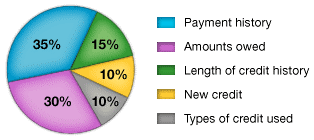Understanding Your Credit Score:
What It Is and How It's Calculated

Credit scores are a crucial part of financial life, impacting everything from securing loans to renting an apartment. We understand that the mortgage process can seem complex and overwhelming, but we're here to help you navigate it with confidence. One crucial aspect of this journey is understanding your credit score and its significance in securing a mortgage. Let's dive into what a credit score is and why it matters, along with the key factors that determine this important number.
What is a Credit Score?
A credit score is a numerical representation of your creditworthiness. It's a three-digit number that summarizes your credit history, helping lenders and creditors assess the risk associated with lending you money. Credit scores typically range from 300 to 850, with higher scores indicating better creditworthiness.
In the mortgage industry the specific type of credit score used, is called a FICO Score. A FICO score is a specific type of credit score created by the Fair Isaac Corporation (FICO). It is one of the most widely used credit scoring models in the United States. FICO scores range from 300 to 850, with higher scores indicating stronger creditworthiness.
Why Is Your Credit Score Important for Mortgages?
- Interest Rates: One of the most significant impacts of your credit score on your mortgage is the interest rate you'll be offered. Lenders typically offer lower interest rates to borrowers with higher credit scores. This means that with an excellent credit score, you can potentially save thousands of dollars over the life of your mortgage.
- Loan Approval: Lenders use your credit score to assess your creditworthiness. A low credit score can make it challenging to secure a mortgage. In contrast, a higher credit score improves your chances of an easier loan approval.
- Down Payment Requirements: A strong credit score can reduce the required down payment for some loan programs. In contrast, borrowers with lower credit scores may be required to make a larger down payment to mitigate risk for the lender.
Factors That Determine Your Credit Score:
1. Payment History (35%): Your payment history is the most influential factor in determining your credit score. It reflects whether you've paid your bills on time, including credit cards, loans, and other accounts. Late payments or missed payments can have a negative impact.
2. Credit Utilization and Amounts Owed (30%): Credit utilization measures how much of your available credit you're using. It's calculated by dividing your outstanding balances by your total credit limit. Keeping this ratio low, ideally below 30%, can positively affect your credit score.
3. Credit History Length (15%): The length of your credit history is important. A longer history demonstrates your experience with managing credit. It considers the age of your oldest account, the average age of your accounts, and how long it's been since you used certain accounts.
4. Types of Credit Used (10%): A diverse credit mix can positively impact your credit score. This considers the types of credit accounts you have, such as credit cards, retail accounts, installment loans, and mortgages. A mix of different account types can show responsible credit management.
5. New Credit Inquiries (10%): Each time you apply for new credit, a hard inquiry is recorded on your credit report. Multiple recent inquiries can signal risk to creditors, potentially lowering your score. Be cautious about applying for new credit too frequently.

Additional Factors to Consider:
- Public Records: Negative information like bankruptcies, tax liens, and civil judgments can significantly impact your credit score.
- Collections: Accounts that have been sent to collections due to non-payment will have a detrimental effect on your score.
- Authorized User Accounts: Being added as an authorized user on someone else's credit card account can impact your credit score. If the primary account holder has a strong credit history, it can benefit your score. However, if they have negative information, it could harm your score.
- Student Loans in Forbearance or Deferment: While not impacting your payment history, lenders may consider deferred or forbearance status on student loans when assessing creditworthiness.
Conclusion:
Your credit score is a critical component of your financial life. It affects your ability to obtain loans, the interest rates you're offered, and even your rental and employment prospects. Understanding the factors that determine your credit score is the first step in managing and improving it.
At Contemporary Mortgage Services, Inc., we're here to help you navigate the world of credit scores and financial well-being. Whether you're looking to boost your credit or learn how to maintain a good score, we've got the resources and expertise to guide you. If you have any questions or need assistance, please don't hesitate to reach out. Your financial success is our priority.
For more info on credit scores, check out our additional pages:
How to Improve Your Credit Score
How to get your Free Credit Report